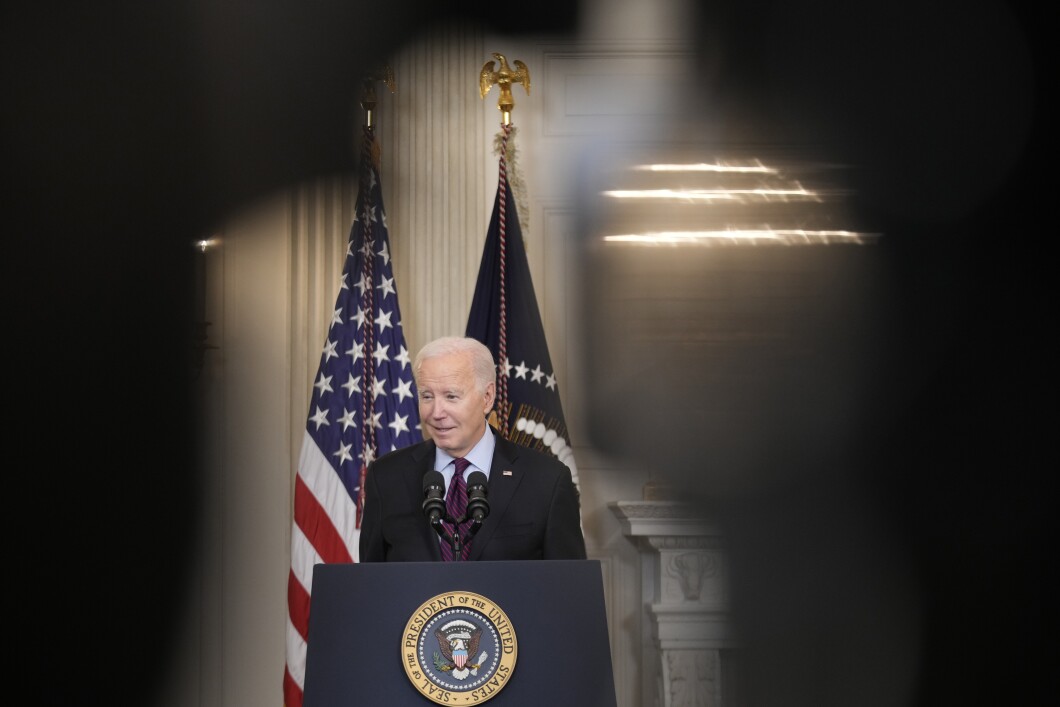
Foreign policy tends to be overshadowed by domestic issues before elections, but national security is becoming a dividing line in Washington as Democrats and Republicans accuse one another of politicizing wars in Ukraine and Israel.
As the White House criticizes new House Speaker Mike Johnson‘s (R-LA) proposed Israel aid bill and Sen. Tommy Tuberville‘s (R-AL) military promotion blockade, Republicans allege President Joe Biden is also undermining the country’s standing internationally.
GRANITE STATE GAFFE: DEMOCRATS PUSH BIDEN WRITE-IN EFFORT IN NEW HAMPSHIRE
The Biden administration is politicizing national security by insisting that the president’s emergency supplemental request not be offset by repealing “ineffective programs,” according to Republican strategist Cesar Conda.
“Are they threatening to veto a bill that funds aid to … Israel because it cuts the budget for a massive expansion of IRS agents?” Conda, a former senior aide to ex-Vice President Dick Cheney and Sen. Marco Rubio (R-FL), told the Washington Examiner.
“Speaker Mike Johnson is correct that we should be prioritizing spending when we face an economically crippling $33 trillion national debt,” he said. “There was no ‘normal, bipartisan process’ when President Ronald Reagan called for supporting anti-communist groups around the world to protect U.S. national security interests, especially in our hemisphere. I can’t think of too many instances where foreign policy has not been politicized by Democrats.”
A similar dynamic is evident on the campaign trail as Republican primary candidates try to differentiate themselves from former President Donald Trump before next week’s third debate, per Lanhee Chen, a Stanford University Hoover Institution fellow and chief policy adviser to then-2012 Republican nominee Mitt Romney.

“On Ukraine, there is a genuine difference between some candidates, like Trump and [biotech entrepreneur Vivek] Ramaswamy, on the one hand, who are leery of additional U.S. involvement and the impact of that involvement on our national security interests, and others, like [onetime U.N. Ambassador Nikki] Haley, who have been more forceful on the need for U.S. engagement and aid to Ukraine,” Chen said.
“The Trump-Ramaswamy position is reflective of the developing populist consensus amongst Republican voters, while the Haley position is the more traditional GOP view that happens to also be reflective of where most elected GOP members of Congress are,” he added. “Regardless of which position wins out, we are seeing some serious foreign policy conversation enter the electoral discussion for the first time in a few cycles. It’s an intriguing moment for sure.”
Johnson proposed a $14.3 billion Israel-only aid bill Monday, compared to Biden’s $106 billion emergency national security supplemental request that covers Israel, Ukraine, Taiwan, and the southern border. While Democrats may have been pressured to vote for a stand-alone measure, Johnson also proposed paying for it by redirecting Inflation Reduction Act funding from the IRS, previewing how he is likely to approach negotiations regarding next month’s potential federal government shutdown. Johnson’s proposal may additionally be opposed by Senate Minority Leader Mitch McConnell (R-KY), who told reporters Tuesday he is in the “same place” “conceptually” as Democrats “in the sense that we view all of these problems as connected.”
Shortly after Secretary of State Antony Blinken and Defense Secretary Lloyd Austin testified before Congress concerning Biden’s supplemental request, their Senate Appropriations Committee appearances Tuesday disrupted by pro-Palestinian protesters, White House national security spokesman John Kirby made another pitch from the briefing room.
“These two issues, Ukraine and Israel, are intertwined,” he said. “History’s taught us that when terrorists don’t pay a price, dictators don’t pay a price, they only cause more chaos, death, and destruction. … To paraphrase Winston Churchill with a little bit of my Florida upbringing, it’s like feeding the alligator hoping that he’s going to eat you last.”
White House press secretary Karine Jean-Pierre released a lengthy statement related to Johnson’s proposal, titled “House Republicans Politicizing National Security,” on Monday night.
“Demanding offsets for meeting core national security needs of the United States — like supporting Israel and defending Ukraine from atrocities and Russian imperialism — would be a break with the normal, bipartisan process and could have devastating implications for our safety and alliances in the years ahead,” she wrote. “Threatening to undermine American national security unless House Republicans can help the wealthy and big corporations cheat on their taxes — which would increase the deficit — is the definition of backwards.”
CLICK HERE TO READ MORE FROM THE WASHINGTON EXAMINER
Jean-Pierre’s colleague, White House spokesman Andrew Bates, has issued similar statements about Tuberville, who on Tuesday indicated he is reconsidering his hold on the nomination of Lt. Gen. Christopher Mahoney to become the Marine Corps assistant commandant after commandant Gen. Eric Smith was hospitalized last weekend due to an apparent heart attack. Tuberville’s blockade is demonstrating the Pentagon providing abortion access to service members and their families.
“The terrorist atrocities in Israel are a stark reminder that America’s military must be ready for anything on a moment’s notice,” Bates said this month. “The men and women who put their lives on the line for their country deserve the absence of self-inflicted attacks on their readiness from self-serving politicians, like Sen. Tuberville.”






